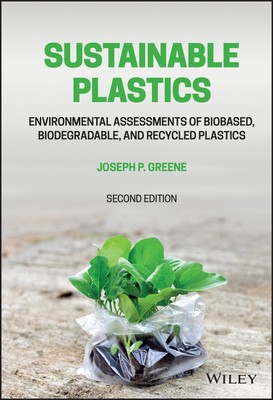
- We will send in 10–14 business days.
- Author: Joseph P Greene
- Publisher: Wiley
- ISBN-10: 1119882060
- ISBN-13: 9781119882060
- Format: 15.2 x 22.9 x 2.5 cm, kieti viršeliai
- Language: English
- SAVE -10% with code: EXTRA
Reviews
Description
Enables Readers to Understand the What, Why, and How Behind Using Sustainable Plastics in Manufacturing Operations
The impact of 50 years of unbridled plastics production, use, and disposal is now becoming well known and documented. Plastics made from non-renewable petroleum and natural gas resources threaten the environment, human health, species maintenance, and the very life of the ocean. This book helps readers understand the ability of plastics to be sustainable and goes over the plastic products which have a lower carbon footprint, lower waste, and lower pollution.
The well-qualified author's unique perspective puts a special focus on comprehensive coverage of environmental impacts of plastics including Life Cycle Assessments (LCA) and sustainability strategies related to biobased plastics (e.g., corn), recycled plastics, and petroleum-based plastics. Other samples topics covered in the book include:
- End-of-life options for petroleum and biobased plastics including mechanical recycling, chemical recycling, and composting
- ASTM biodegradation standards for compost, marine, anaerobic digestion, and landfill environments
- Polymer processing, including injection molding, blow molding, extrusion, and compression molding
- Environmental data and coverage of petroleum plastics, sustainable composites, and new information on bio-based plastics
The book serves as an invaluable resource for plastics engineers, materials engineers, and all professionals in related disciplines looking to understand and apply the usage of sustainable plastics in many different types of manufacturing operations.
EXTRA 10 % discount with code: EXTRA
The promotion ends in 22d.16:02:27
The discount code is valid when purchasing from 10 €. Discounts do not stack.
- Author: Joseph P Greene
- Publisher: Wiley
- ISBN-10: 1119882060
- ISBN-13: 9781119882060
- Format: 15.2 x 22.9 x 2.5 cm, kieti viršeliai
- Language: English English
Enables Readers to Understand the What, Why, and How Behind Using Sustainable Plastics in Manufacturing Operations
The impact of 50 years of unbridled plastics production, use, and disposal is now becoming well known and documented. Plastics made from non-renewable petroleum and natural gas resources threaten the environment, human health, species maintenance, and the very life of the ocean. This book helps readers understand the ability of plastics to be sustainable and goes over the plastic products which have a lower carbon footprint, lower waste, and lower pollution.
The well-qualified author's unique perspective puts a special focus on comprehensive coverage of environmental impacts of plastics including Life Cycle Assessments (LCA) and sustainability strategies related to biobased plastics (e.g., corn), recycled plastics, and petroleum-based plastics. Other samples topics covered in the book include:
- End-of-life options for petroleum and biobased plastics including mechanical recycling, chemical recycling, and composting
- ASTM biodegradation standards for compost, marine, anaerobic digestion, and landfill environments
- Polymer processing, including injection molding, blow molding, extrusion, and compression molding
- Environmental data and coverage of petroleum plastics, sustainable composites, and new information on bio-based plastics
The book serves as an invaluable resource for plastics engineers, materials engineers, and all professionals in related disciplines looking to understand and apply the usage of sustainable plastics in many different types of manufacturing operations.


Reviews